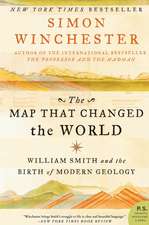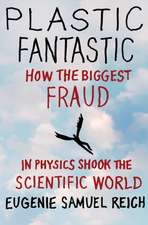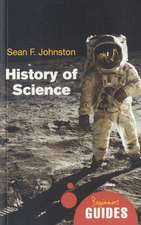How James Watt Invented the Copier: Forgotten Inventions of Our Great Scientists
Autor René Schilsen Limba Engleză Paperback – 14 dec 2011
Preț: 190.23 lei
Nou
Puncte Express: 285
Preț estimativ în valută:
36.40€ • 38.11$ • 30.12£
36.40€ • 38.11$ • 30.12£
Carte disponibilă
Livrare economică 15-29 martie
Preluare comenzi: 021 569.72.76
Specificații
ISBN-13: 9781461408598
ISBN-10: 1461408598
Pagini: 177
Ilustrații: VII, 170 p. 98 illus., 17 illus. in color.
Dimensiuni: 155 x 235 x 15 mm
Greutate: 0.27 kg
Ediția:2012
Editura: Springer
Colecția Springer
Locul publicării:New York, NY, United States
ISBN-10: 1461408598
Pagini: 177
Ilustrații: VII, 170 p. 98 illus., 17 illus. in color.
Dimensiuni: 155 x 235 x 15 mm
Greutate: 0.27 kg
Ediția:2012
Editura: Springer
Colecția Springer
Locul publicării:New York, NY, United States
Public țintă
Popular/generalCuprins
Johannes Kepler: Keplers laws – Snow crystals.- Robert Hooke: Hooke’s law – Surveyor and architect.- Edmond Halley: Comet – Mortality tables.- Daniel Bernoulli: Bernoulli’s principle – Utility function.- Benjamin Franklin: Electricity – Gulfstream.- Joseph Priestley: Oxygen – Carbonated water.- James Watt: Steam engine – Copier.- Edward Jenner: Pox vaccine – Cuckoo’s nest.- John Dalton: Atomic theory – Colour blindness.- Thomas Young: Light – Rosetta Stone.- Justus von Liebig: Fertilizer – Stock.- Charles Darwin: Evolution – Earthworms.- William Thomson: Absolute temperature – Transatlantic cable.- James Clerk Maxwell : Maxwell equations – Colour photo.- Alexander Graham Bell: Telephone – Artificial resuscitation.- Hendrik Antoon Lorentz: Electron theory – Enclosing dyke.- Svante Arrhenius: Ionic theory – Global warming.- Pierre Curie: Radioactivity – Piezo-electricity.- Walther Nernst : Thermodynamics – Neo-Bechstein piano.- Albert Einstein: Relativity – Refrigerator.- Harlow Shapley: Center of the Milky Way – Ants.- Erwin Schrödinger: Wave equation – What is life?.- Enrico Fermi: Nuclear reaction – Fermi’s paradox.- Rosalind Franklin: DNA – Carbon.- George Gamow: Big Bang – Genetic code.
Notă biografică
Since 2005, René Schils has been a freelance science writer and in the past five years has written nearly twenty articles on this topic for the Dutch science magazine ‘Natuurwetenschap en Techniek’. Subsequently, these articles were used as the basis for this book. Currently, René writes popular science articles on varying topics for several science magazines, which can be viewed at the author’s website www.reneschils.nl.
Textul de pe ultima copertă
Features 25 different scientists and the ideas which may not have made them famous, but made history…
Typically, we remember our greatest scientists from one single invention, one new formula or one incredible breakthrough. This narrow perspective does not give justice to the versatility of many scientists who also earned a reputation in other areas of science. James Watt, for instance, is known for inventing the steam engine, yet most people do not know that he also invented the copier. Alexander Graham Bell of course invented the telephone, but only few know that he invented artificial breathing equipment, a prototype of the ‘iron lung’. Edmond Halley, whose name is associated with the comet that visits Earth every 75 years, produced the first mortality tables, used for life insurances. This entertaining book is aimed at anyone who enjoys reading about inventions and discoveries by the most creative minds. Detailed illustrations of the forgotten designs and ideas enrich the work throughout.
Typically, we remember our greatest scientists from one single invention, one new formula or one incredible breakthrough. This narrow perspective does not give justice to the versatility of many scientists who also earned a reputation in other areas of science. James Watt, for instance, is known for inventing the steam engine, yet most people do not know that he also invented the copier. Alexander Graham Bell of course invented the telephone, but only few know that he invented artificial breathing equipment, a prototype of the ‘iron lung’. Edmond Halley, whose name is associated with the comet that visits Earth every 75 years, produced the first mortality tables, used for life insurances. This entertaining book is aimed at anyone who enjoys reading about inventions and discoveries by the most creative minds. Detailed illustrations of the forgotten designs and ideas enrich the work throughout.
Caracteristici
Reveals the forgotten but magnificent and ingenious inventions of the greatest scientists of the past centuries Presents the discoveries of famous scientists for which they are actually not known Provides ample unique figures which illustrate the forgotten designs of the greatest researchers throughout history Includes supplementary material: sn.pub/extras













